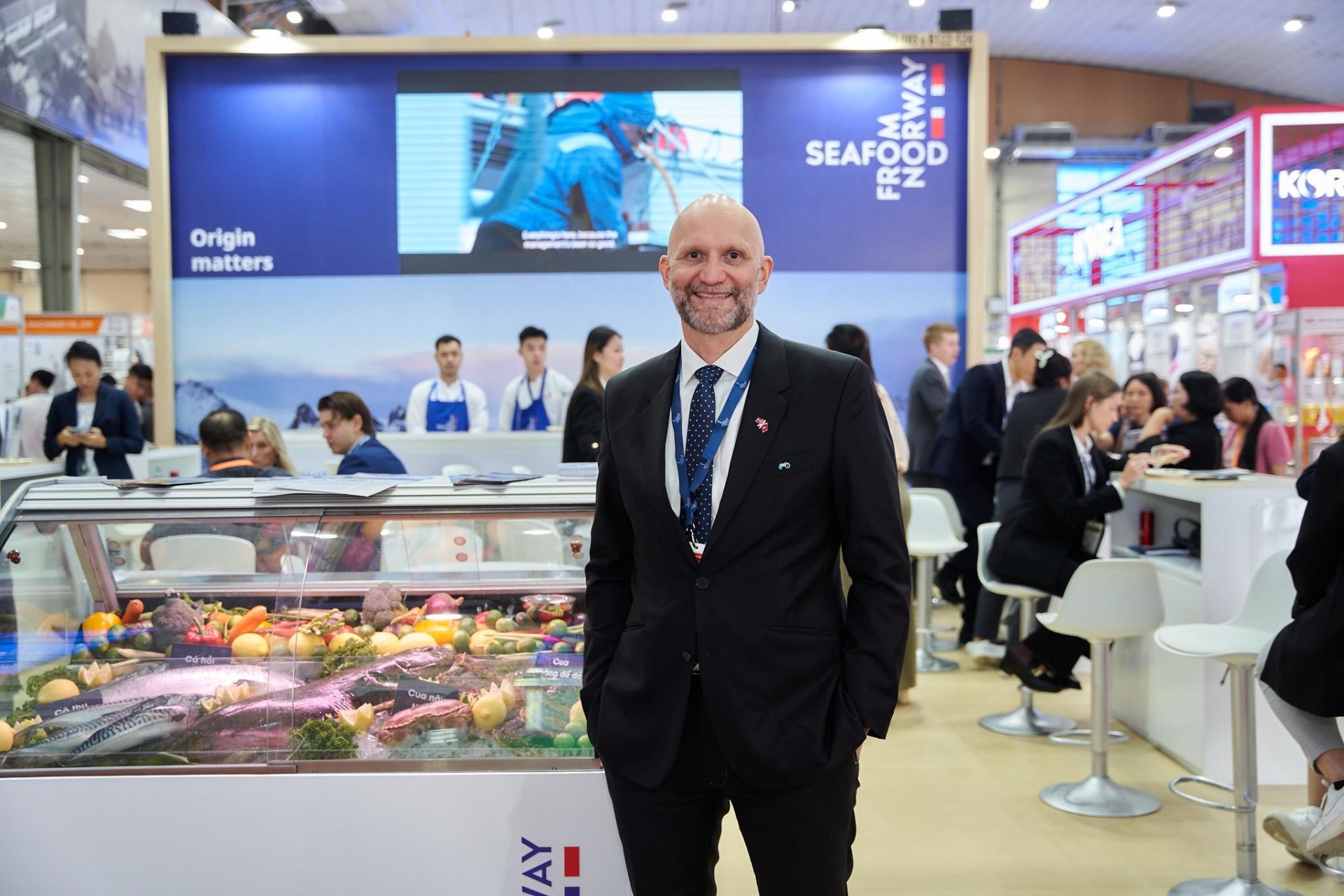The secrets behind making Norwegian salmon a global star
 |
| Rørtveit at the Norwegian Seafood Council booth at VietFood and Beverage |
What factors have been the most important in enabling Norwegian salmon to reach its global status?
Every day, over 40 million servings of Norwegian salmon are enjoyed by diners in more than 150 countries worldwide.
Its success isn't attributed to a single secret, it is the result of several factors, including strict adherence to regulations, sustainable practices, and a commitment to producing high-quality products. Sustainability is a crucial aspect of this.
Through collaborations with relevant stakeholders in the industry, the Norwegian government has enforced stringent regulations and guidelines to ensure environmental sustainability in its aquaculture operations. This approach includes implementing stocking limits, conducting strict environmental impact assessments, and continuous water quality monitoring to minimise the ecological impacts.
To produce high-quality salmon, does Norway have rigorous standards and criteria?
Norway's commitment to ensuring the quality and safety of its seafood products, including salmon, stems from a comprehensive and meticulous management system that governs all aspects of seafood production.
We have strict control measures to meet international safety and quality standards. This involves routine inspections of processing facilities and strict adherence to food safety and hygiene regulations.
| Norway's commitment to ensuring the quality and safety of its seafood products, including salmon, stems from a comprehensive and meticulous management system that governs all aspects of seafood production. |
For example, the feed for the salmon is free from genetically modified organisms, chemicals, and growth hormones.
It contains vitamins, minerals, and antioxidants, with 75 per cent of the ingredients sourced from plants and 25 per cent from marine ingredients like groundfish and shrimp.
Furthermore, Norway has significantly reduced the use of antibiotics. Since 1987, this figure has decreased by an astonishing 99 per cent, with only 0.14 grams of antibiotics used per tonne of salmon.
Even during transportation and export, the country maintains stringent standards for packaging, temperature control, and transportation conditions, ensuring that Norwegian seafood products reach international markets in the best possible condition.
What is the secret behind producing some of the world's largest, healthiest, and most nutritious salmon?
The worldwide reputation for producing top-quality salmon results from a multidimensional research and care process. This commitment underscores Norway's position at the forefront of the industry.
The most critical aspect of this process is selective breeding, which involves carefully choosing parent salmon with desirable traits, such as fast growth rates, disease resistance, and overall good health. By selectively breeding from these individuals, Norwegian researchers have consistently produced generations of salmon with superior genetics.
Additionally, scientists continuously strive to enhance the growth potential of salmon, ensuring that they reach market size efficiently. This improves productivity and reduces the environmental impact of salmon farming.
 |
| Asbjørn Warvik Rørtveit introducing Norwegian salmon at the first-ever Norwegian Salmon Academy in Vietnam |
At the salmon museum in Alta in Norway, a sign says, "What would salmon sushi be without Norwegian salmon?" What was the main factor that made salmon sushi such a popular dish?
When it comes to salmon sushi, Japan is often the first place that springs to mind.
Yet, the roots of this culinary sensation can be traced back to Norway. In 1985, Thor Listau, then serving as the Norwegian Minister of Fisheries, led a delegation to Japan with a pioneering mission – introducing Norwegian salmon sushi to the Land of the Rising Sun.
During that era, the Japanese predominantly indulged in sushi made from tuna and sea bream. Raw salmon wasn't part of their culinary tradition, as they held reservations about their local salmon being prone to parasites and lacking the ideal taste, colour, and aroma for raw consumption.
In response, Thor Listau and his team set out on a quest to convince the Japanese that salmon from Norway's cold North Atlantic waters was not only different but also ideally suited to sushi.
Norwegian salmon exporters tailored their products to align with Japanese tastes to make this happen. They introduced salmon sushi and sashimi, perfectly catering to the Japanese preference for the freshness of raw fish. Furthermore, they crafted salmon products to harmonise with local culinary customs.
With time, these tireless efforts bore fruit. Japanese consumers gradually embraced salmon as an integral part of their cuisine.
This transformation wasn't confined to Japan, eventually spreading to other corners of the world. Today, Norwegian salmon is synonymous with quality and freshness. It enjoys a cherished status in sushi restaurants and households worldwide, where approximately 40 million servings are relished daily.
 | Norwegian companies bring green tech solutions to Vietnam Nearly a dozen Norwegian companies are presenting their expertise and tech solutions to help promote a sustainable green economy in Vietnam. |
 | Vietnam a 'star in global supply chain' Vietnam is a star in the global supply chain in terms of garments and textiles, footwear and electricity, according to a new report. |
 | Norwegian fund expected to lead SeABank private share offering Southeast Asia Commercial Joint-Stock Bank (SeABank) plans to issue up to 94.6 million shares, with the Norwegian Investment Fund, Norfund, being the expected primary investor, signifying a significant bolstering of foreign investment. |
What the stars mean:
★ Poor ★ ★ Promising ★★★ Good ★★★★ Very good ★★★★★ Exceptional
Related Contents
Latest News
More News
- State corporations poised to drive 2026 growth (February 03, 2026 | 13:58)
- Why high-tech talent will define Vietnam’s growth (February 02, 2026 | 10:47)
- FMCG resilience amid varying storms (February 02, 2026 | 10:00)
- Customs reforms strengthen business confidence, support trade growth (February 01, 2026 | 08:20)
- Vietnam and US to launch sixth trade negotiation round (January 30, 2026 | 15:19)
- Digital publishing emerges as key growth driver in Vietnam (January 30, 2026 | 10:59)
- EVN signs key contract for Tri An hydropower expansion (January 30, 2026 | 10:57)
- Vietnam to lead trade growth in ASEAN (January 29, 2026 | 15:08)
- Carlsberg Vietnam delivers Lunar New Year support in central region (January 28, 2026 | 17:19)
- TikTok penalised $35,000 in Vietnam for consumer protection violations (January 28, 2026 | 17:15)

 Tag:
Tag:


























 Mobile Version
Mobile Version